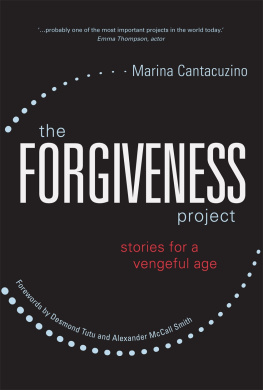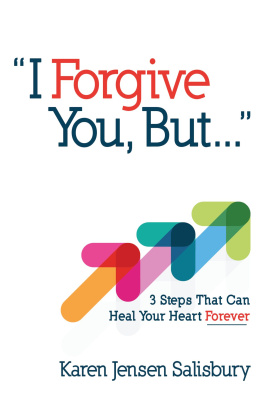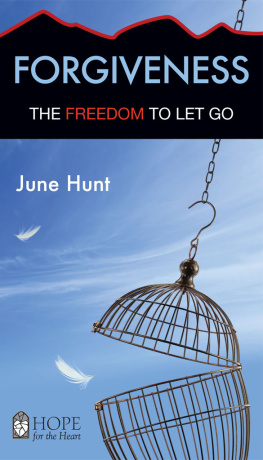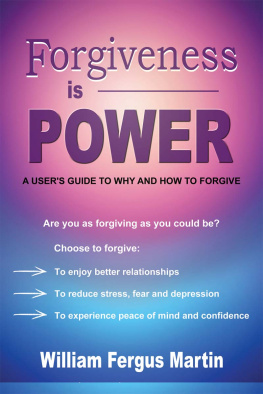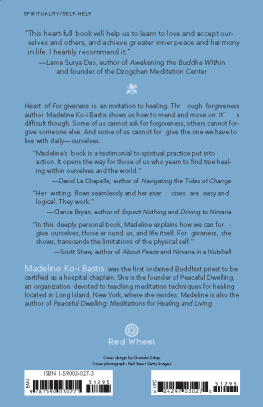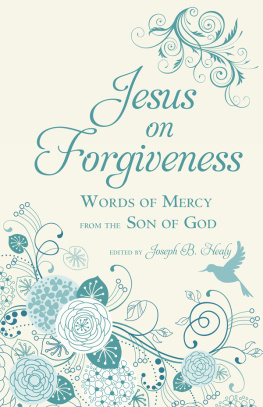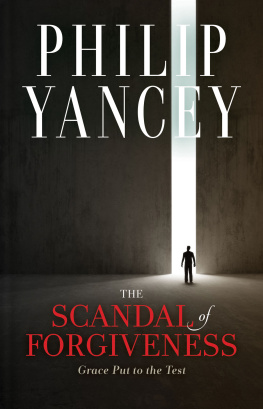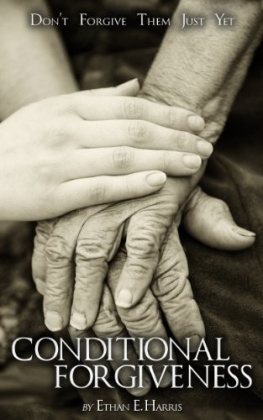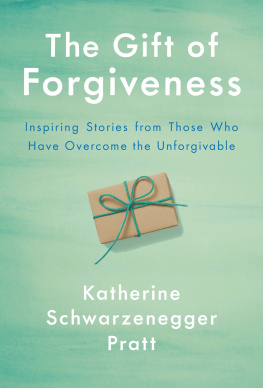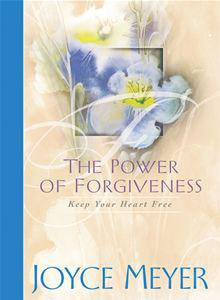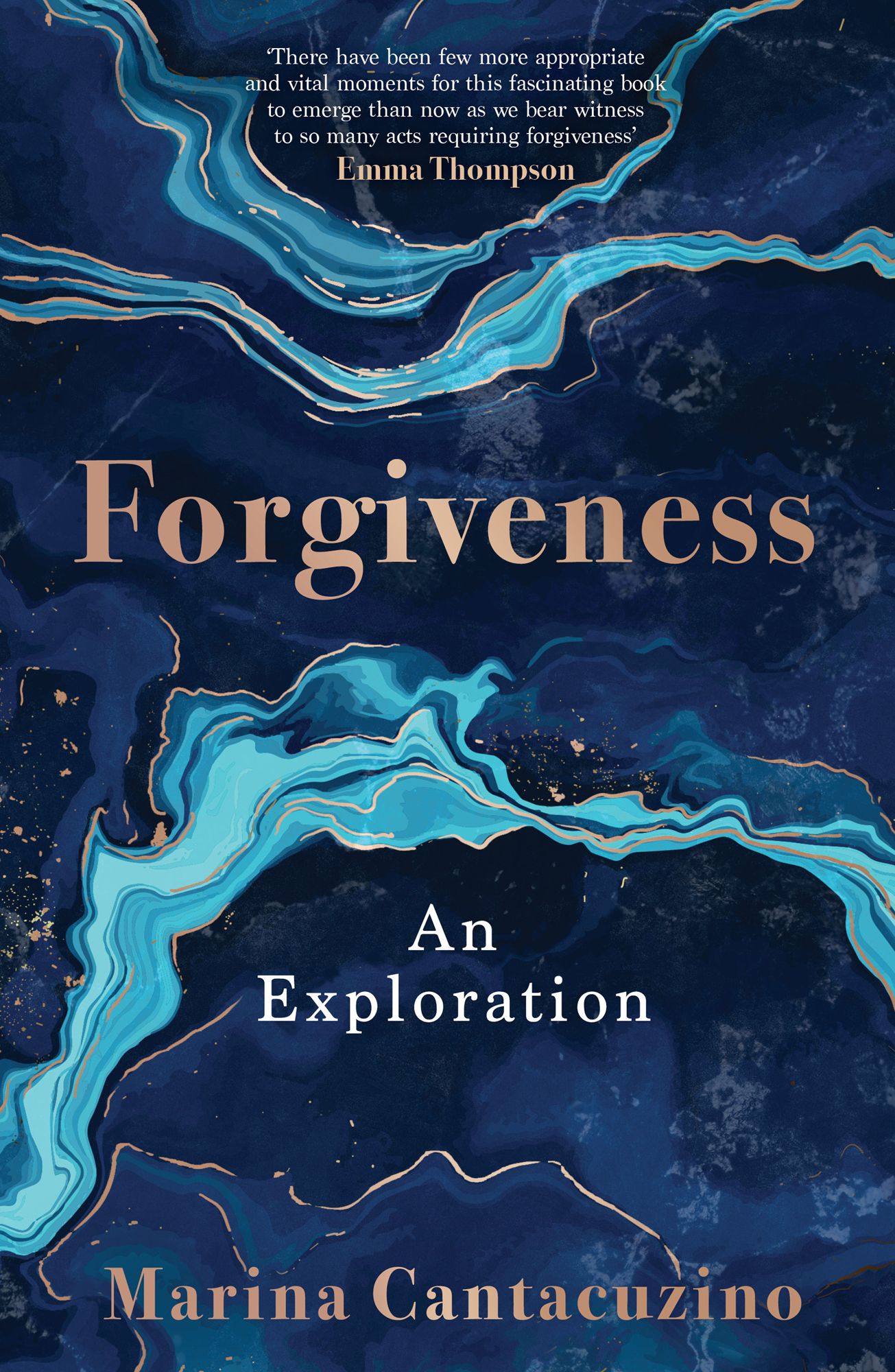Contents
Guide
There have been few more appropriate and vital moments for this fascinating book to emerge than now as we bear witness to so many acts requiring forgiveness Emma Thompson
Forgiveness
An Exploration
Marina Cantacuzino
There have been few more appropriate and vital moments for this fascinating book to emerge than now as we bear witness to so many acts requiring forgiveness the complexity of the practice of forgiveness, its meanings, its measure as a force for change are all here and most of all, its power to prevent the repetition of the worst in our human behaviour and the possibility of finding freedom from hatred
Emma Thompson
This is an utterly memorable book beautifully written, fascinating in its insights, and extraordinarily moving. We all need to forgive, and this book, through its recounting of the stories of people who have something really significant to forgive, will be an inspiration to help us reach a state of forgiveness. This is a book that will stay with the reader for a very long time
Alexander McCall Smith
A wise and generous investigation of one of lifes most difficult but necessary experiences
Richard Holloway
This important book will speak to anyone who has ever suffered harm, or caused harm to others; which is all of us. The work is unflinching in its honesty and emphasis on forgiveness as a process that cannot be imposed; but it is also immensely hopeful as it invites us to see the possibilities of forgiveness as a human stance that offers hope and freedom from hatred. Anyone with a serious interest in human cruelty and suffering should read this book; it will stretch your mind
Gwen Adshead, author of The Devil You Know
This reassuring and uplifting book testifies to the truth of forgiveness Both provocative and full of hope
Jon Snow
This book is so profoundly for the current moment that I encourage you to read it without delay. What is forgiveness? Impossible yet necessary; difficult yet obvious; painful yet alive with promise. Compelling, convincing and compassionate, this book will make you to examine your relationship with yourself, with others, and with the world. A work as beautiful as it is important
Tessa McWatt, author of Shame on Me
This book is a beautiful tour de force about a very hard subject an important read for everyone who has wrestled with forgiving, being forgiven, or both
Sally Kohn, activist and author of The Opposite Of Hate
What marks Marina Cantacuzinos book on forgiveness is that it is an enquiry rather than a persuasion. With journalistic skill, she observes, questions and considers stories; offering insights, but never prescribing. She amplifies stories we never want to hear, but desperately need to hear, offering wisdom from a human tradition that is as embodied as it is enduring: how to survive what we think is unsurvivable. Ive followed her work for years, and this brilliant book is a remarkable exploration of her decades-long fascination with forgiveness, its complications and its gifts
Pdraig Tuama
Not only is this book exceptional for its human interest and accessibility, it is full of profound insights into the complexity of forgiveness and its wide range of meanings, problems and benefits. Every page exudes the empathy-filled curiosity that has characterised Marinas exploration of forgiveness over the last two decades. Few will be able to read it without catching some of the empathy or sharing the curiosity, and no one will read it without becoming a little wiser and more humane
The Reverend Dr Stephen Cherry, Dean, Kings College, Cambridge
P ROLOGUE
Stories are the secret reservoir of values: change the stories individuals and nations live by and tell themselves, and you change the individuals and nations.
BEN OKRI
Wilma Derksen knows exactly what it means to be the public face of forgiveness, having been both lauded and vilified for forgiving her daughters killer. Labelled by the media as the voice of mercy, she has spent the last thirty-six years of her life facing the relentless forces of public scrutiny, coming to terms with a tragedy that has both defined and consumed her.
For many it makes no sense at all as to why Wilma and her husband Cliff decided to forgive the man who took their daughters life; and in particular why they made this decision just hours after the body of thirteen-year-old Candace was found on a bitterly cold January day in 1985, bound and frozen in a shed in Winnipeg, Canada.
The hunt for Candace Derksen, who disappeared on her way home from school, stretched over seven weeks, and so to locals her killing has always felt both intimate and personal. When I met the Derksens, nearly thirty years later during a visit to Canada in 2013, the story was still imprinted on many peoples psyches, not least because the man who had been convicted of the crime six years earlier was now appealing his prison sentence. I was invited to share a meal around the Derksens kitchen table with a couple of their oldest friends, who, like them, were both practising Mennonites. Over dinner, the conversation ambled between Winnipegs unseasonably cold weather that October, my research for a Winston Churchill Memorial Fellowship, which was the reason I was in Canada, and Wilmas latest publication as a prolific author and journalist.
Afterwards, Wilma took me into their front room, and here, among her books and family photographs, she proceeded to explain exactly why the couple had chosen to forgive their daughters killer.
It was a very easy decision to make, said Wilma. She explained how on the day Candaces body was discovered friends and neighbours had brought food and gifts to the house, something which for a few hours provided consolation for the parents and their two other children, putting a layer of loving protection between the family and that dreadful discovery. A little later, shortly after most of their friends had left, there was a knock on the door and a stranger stood there, dressed in black. He had read about the tragedy in the newspaper, and he wanted to help. He told them he was also the parent of a murdered child and was here to warn them of this alien and frightening world they were about to enter. Then he proceeded to list everything he had lost since his daughters death. He told them he had lost his health, his relationships, his concentration and his ability to work. He had even lost all memory of the child he held so precious because now the story of the murder was lodged so deep in his brain that it left little room for anything else.
The strangers appearance at their door was an unspoken invitation to an exclusive club of parents bereaved and broken through murder. But Wilma and Cliff were determined not to join. Finding themselves almost comforting the man, they politely listened and then showed him to the door. His arrival in our home was a kind of reckoning, said Wilma, because having just been through the immense pain of losing our daughter, it now seemed we might lose everything else as well.
This was how forgiveness became a lifeline for the Derksens a conscious decision born out of a dread of what unforgiveness might bring. Having been presented with the bleakest of futures, the couple went to bed that night and made a solemn vow. They promised themselves that they would respond very differently, by instead trying to forgive the person who had wreaked havoc in their lives, even though, at this point, they didnt know who the perpetrator was.


